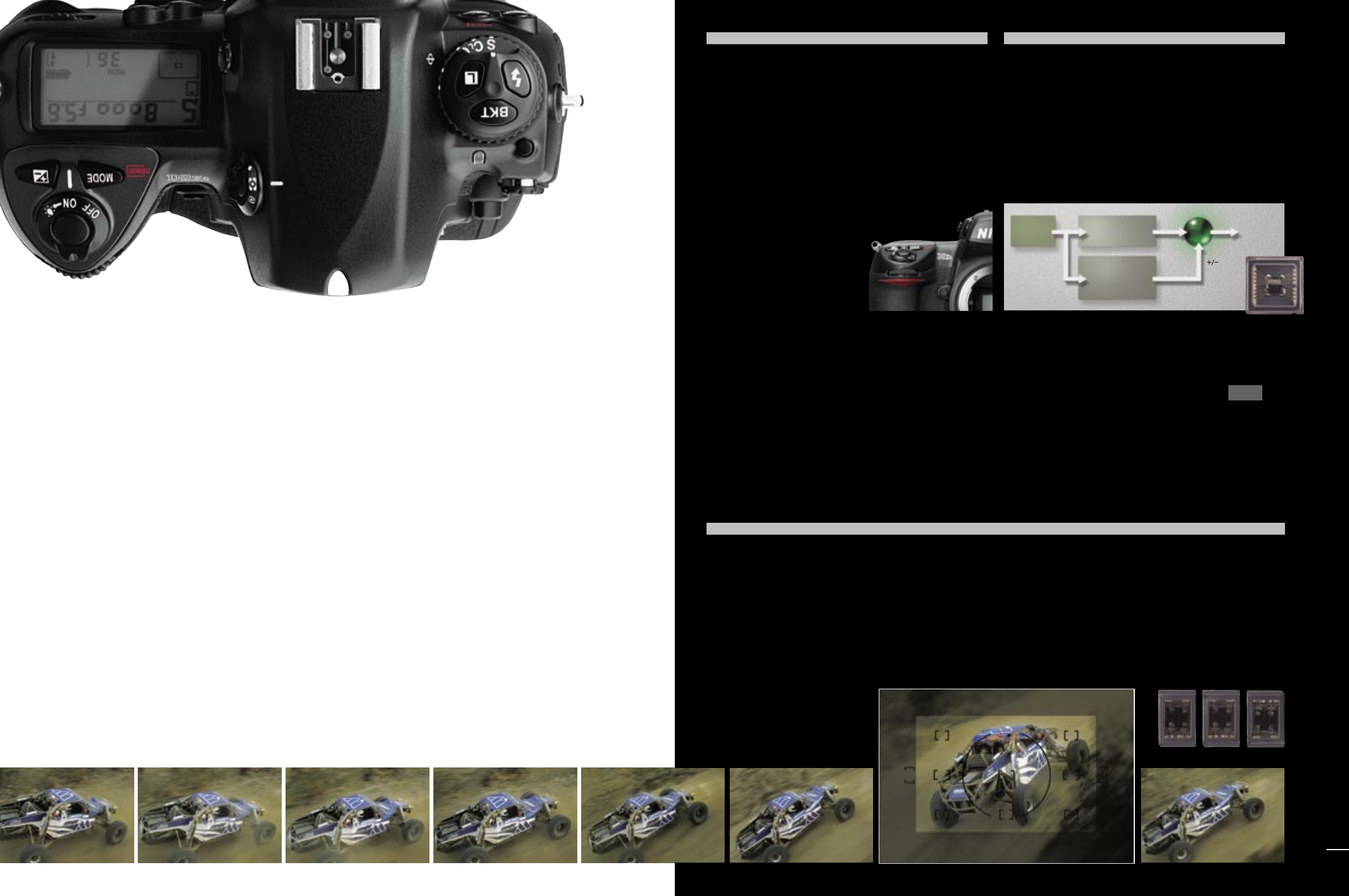
Updated to perform even faster and with greater precision in the D2Xs, the
11-area AF system employs Nikon’s advanced Multi-CAM 2000 AF Sensor
Module. Of these 11 widely spread AF sensors, 9 are cross-type sensors
positioned in the logical rule-of-thirds array. All 9 cross-type sensors remain
active when using High-speed Crop mode.
The following selection of operating modes is designed to ensure maximum
flexibility and optimum performance in different shooting situations.
• Single-area AF allows the photographer to lock the focus using any one of the
11 AF spot sensors. Single-area AF has been tuned for the D2Xs to reduce AF
hunting for low-contrast subjects.
• Dynamic AF with Focus Tracking and
Lock-on™ follows the subject if it moves from
its original position once a priority focus area
is selected, and ensures accurate focusing by
shifting instantly and automatically to the focus
area into which the subject has moved. Subject
acquisition and tracking capability are improved for the D2Xs, while new options
for controlling the timing of the focus tracking lock-on make it easier to adjust for
shooting different types of scenes and action.
• Closest Subject Priority Dynamic AF automatically identifies one or more
focus areas as needed, to capture the subject the AF system determines to be
closest to the camera.
• Group Dynamic AF combines groups of AF sensor activity into logical
patterns. Both Dynamic AF and Closest Subject options are available and are
useful when shooting moving subjects that remain in a specific area of a framed
scene in which a lot of peripheral action might also be taking place.
The D2Xs is designed with instant start-up and optimized systems that maximize
all-round performance for immediate response. As a result, the D2Xs is ready to
shoot whenever a decisive moment may arise.
This performance combines with the industry’s shortest shutter release time
lag of a mere 37 milliseconds to realize high-resolution photography without
compromise.
Instant response & ultra-short shutter lag
The D2Xs offers versatility in its selection of continuous shooting speed modes.
In addition to taking a total number of 60 consecutive shots, capture 12.4
megapixel files at 5 frames per second for 17 consecutive RAW (NEF) or 22
JPEG shots. Or, use the exclusive High-speed Crop mode to shoot at 8 frames
per second for 29 consecutive RAW (NEF) or 38 JPEG shots. High-speed Crop
mode uses data from the central area of the sensor that results in a picture
angle comparable to that of a 35mm lens with double the focal length. This
provides a useful option when shooting sports, animals or other fast-moving
objects from a distance.
High-speed continuous shooting
Modes and controls for optimizing exposure
Modes include [P] Programmed Auto with Flexible Program, [S] Shutter-priority
Auto, [A] Aperture-priority Auto, and [M] Manual. Manual exposure compensation
is available from -5 to +5 EV in 1/3, 1/2 or 1 EV steps.
3D-Color Matrix Metering II
To achieve optimum exposure for each shot, Nikon’s acclaimed 1,005-pixel RGB
Exposure/Color Matrix Metering Sensor and advanced algorithms determine
the brightness and size of highlight areas, while at the same time evaluating all
brightness, color, contrast, selected focus area and subject-to-camera distance
information. The results are then referenced against a comprehensive onboard
database of scenes acquired from actual photographs before high-speed
processing calculates the final value to deliver consistent and dependable
automatic exposure.
Refinements to the D2Xs add the availability of 3D-Color Matrix Metering II in
High-speed Crop mode, while also optimizing the areas calculated for using
Center-weighted metering, Spot metering and i-TTL Flash Control.
1,005-pixel
RGB
Sensor
Exposure
evaluation
algorithm
Estimates
overexposed areas
Final
exposure
value
Correction
Value
Exposure
quantization
algorithm
Shutter speeds from 30 seconds to 1/8,000 second can be selected in 1/3, 1/2
or 1 EV steps, with Bulb exposure also available. Flash synchronization is
possible using speeds up to 1/250 second, or up to 1/8,000 second
when using AUTO FP High-Speed Sync with an SB-800, SB-600 or
SB-R200 Speedlight.
Fast shutter speeds
11-area AF system with 9 cross-type AF sensors
Sensitivity can be manually set between ISO-equivalent 100 and 800 in increments
of 1/3 EV, or boosted using the HI-0.3, HI-0.5, HI-0.7, HI-1 or HI-2 settings when
high sensitivity is a priority. The 3 settings between 800 and HI-1 are newly added
to give the D2Xs finer control over sensitivity.
Automatic sensitivity adjustment helps achieve optimum exposure while freeing
the photographer to concentrate on composition. Offering greater control over the
range within which AUTO ISO operates, the D2Xs provides settings to specify the
maximum value to which the function can increase sensitivity and the minimum
shutter speed at which AUTO ISO will operate.
Manual and Automatic ISO sensitivity control
Image quality mode: RAW (NEF) • Lens: AF-S VR Zoom-Nikkor 24-120mm f/3.5-5.6G ED-IF • Exposure mode: [A] 1/40 second, f/3.5 • White balance: Direct sunlight • Sensitivity: ISO-equiv. 100
Instant response Accurate exposure metering
High-speed focusing
6
7
Instant response, pinpoint precision and optimum exposure
Capturing the moment with exceptional image quality demands instant response, high-speed operation, precise focus and accurate
exposure. Ground-up development aimed at satisfying these professional needs continues to evolve in the further refined 11-area
AF system, advanced exposure metering and optimized subsystems of the Nikon D2Xs.
Active quality —
Vic Huber
“The combination of race cars, helicopters, radio
communications and weather conditions makes
an assignment like this most difficult. Despite such
complexity, the advanced technology of the D2Xs gives
me the confidence to focus on composition while it
handles the rest – instantly, reliably and precisely.”
1,005-pixel RGB Sensor
Multi-CAM 2000 AF Sensor Module
Viewfinder image in High-speed Crop mode
New










